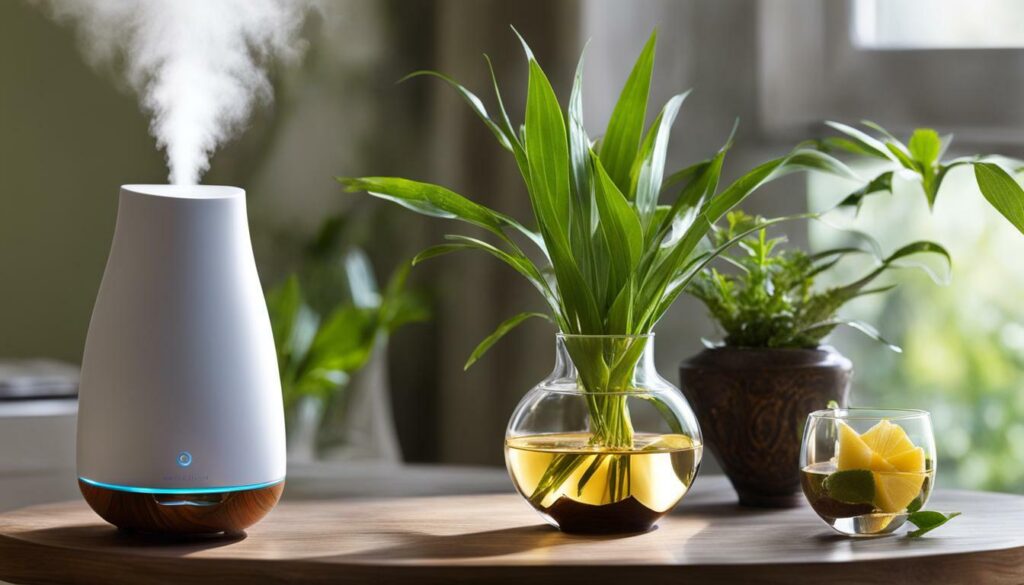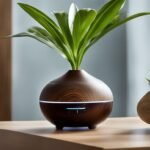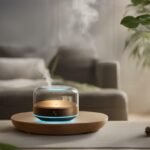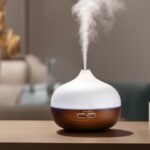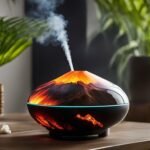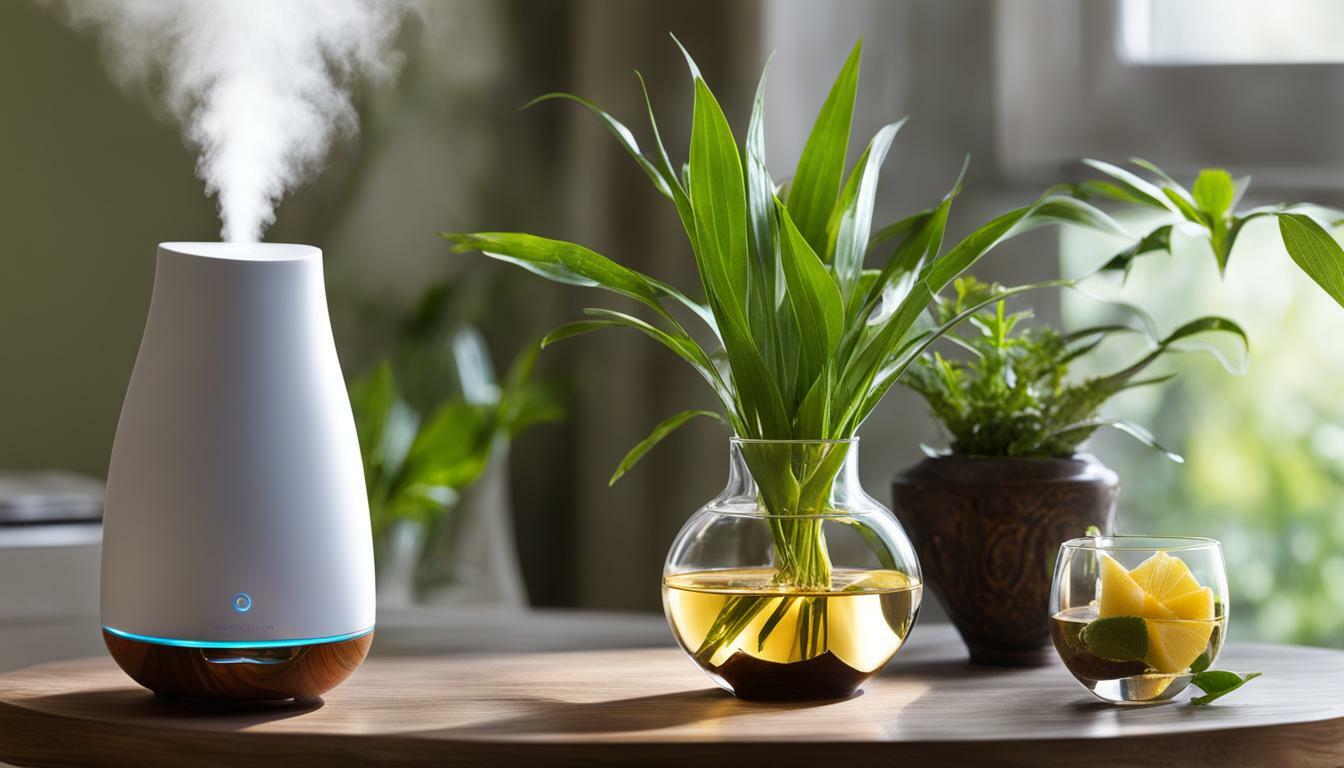
Welcome to the “Oil Diffuser vs Humidifier” debate, where we’ll delve into the features, advantages, and ideal applications of these two popular devices. In this section, we will explore the differences between an oil diffuser and a humidifier, including their primary functions, benefits, drawbacks, and how they can be used in various home environments.
The main difference between an oil diffuser and a humidifier is their primary function. A humidifier adds moisture to the air, while a diffuser emits essential oils for aromatherapy purposes. Humidifiers come in different types, including cool mist and warm mist humidifiers, which increase the humidity level in the air to alleviate dryness and improve respiratory conditions. On the other hand, diffusers utilize different technologies like ultrasonic vibrations or evaporation to disperse essential oils into the air, providing relaxation and mood enhancement.
Both humidifiers and diffusers have their pros and cons. Humidifiers can help with skin dryness, sinus problems, and protect hardwood floors, while diffusers provide aromatherapy benefits, are simple to operate, and offer a variety of scents. Ultimately, the choice between a humidifier and a diffuser depends on personal preferences and the desired benefits for the home environment.
Primary Functions of Oil Diffusers and Humidifiers
To understand the distinctions between oil diffusers and humidifiers, it’s crucial to grasp their primary functions and how they uniquely contribute to the air quality in your home.
Humidifiers, as the name suggests, are designed to add moisture to the air. They come in various types, such as cool mist and warm mist humidifiers, each offering specific benefits. Cool mist humidifiers use ultrasonic technology to produce a fine mist that increases humidity levels, making them ideal for hot climates or households with children. Warm mist humidifiers, on the other hand, use heating elements to release steam into the air, effectively combating cold and flu symptoms.
Oil diffusers, on the other hand, focus on dispersing essential oils into the air for aromatherapy purposes. They utilize different technologies like ultrasonic vibrations or evaporation to release the aromatic oils, which can enhance relaxation, improve mood, and create a spa-like atmosphere in your home. Whether you prefer the invigorating scent of eucalyptus or the calming aroma of lavender, a diffuser can help you create the perfect ambiance.
| Humidifiers | Oil Diffusers |
|---|---|
| – Add moisture to the air | – Disperse essential oils |
| – Alleviate dryness | – Enhance relaxation |
| – Improve respiratory conditions | – Improve mood |
Ultimately, the choice between an oil diffuser and a humidifier depends on your personal preferences and the desired benefits for your home environment. If you’re looking to combat dryness, improve respiratory conditions, or protect hardwood floors, a humidifier may be the ideal option. On the other hand, if you seek the benefits of aromatherapy, relaxation, and a wide selection of scents, an oil diffuser may be the perfect choice. Consider your needs, preferences, and the specific requirements of your living space to make an informed decision.
Benefits of Humidifiers
Humidifiers provide a range of benefits that go beyond simple moisture balance, offering advantages specifically aimed at promoting healthier living environments. These devices are designed to increase the humidity level in the air, which can have several positive effects on your overall well-being.
One of the main benefits of using a humidifier is that it helps alleviate dryness. Dry air can lead to a variety of discomforts, such as dry skin, chapped lips, and irritated nasal passages. By adding moisture to the air, humidifiers help prevent these issues and keep your skin and respiratory system hydrated.
In addition to combating dryness, humidifiers also contribute to improving respiratory conditions. They can be particularly beneficial for individuals with allergies, asthma, or sinus problems. By maintaining optimal humidity levels, humidifiers help soothe irritated airways, reduce congestion, and ease breathing difficulties.
Furthermore, humidifiers can play a significant role in safeguarding your hardwood floors. Dry air can cause wood to shrink, leading to gaps and cracks in your flooring. By adding moisture to the air, humidifiers help maintain the proper moisture balance in your home, preventing potential damage to your hardwood floors.
| Benefits of Humidifiers |
|---|
| Alleviates dryness |
| Improves respiratory conditions |
| Safeguards hardwood floors |
By investing in a humidifier, you can create a more comfortable and healthier living environment for yourself and your family. However, it is essential to choose the right type of humidifier based on your specific needs and the size of your space. Whether you opt for a cool mist humidifier or a warm mist humidifier, incorporating one into your home can provide significant benefits for your overall well-being.
Benefits of Oil Diffusers
Oil diffusers bring an array of advantages to your home, from creating a serene ambiance to providing personalized aromatherapy benefits that can uplift your mood and well-being. These devices use advanced technologies like ultrasonic vibrations or evaporation to disperse essential oils into the air, transforming your living space into a fragrant sanctuary.
Enhancing Relaxation
One of the key benefits of oil diffusers is their ability to promote relaxation. By diffusing calming essential oils such as lavender or chamomile, you can create a soothing atmosphere that helps relieve stress and anxiety. The gentle aroma fills the room, creating a tranquil environment conducive to mindfulness, meditation, or simply unwinding after a long day.
Improving Mood and Well-being
The power of scent should not be underestimated when it comes to influencing our emotions. Oil diffusers allow you to choose from a wide variety of essential oils, each with its own unique scent and properties. Citrus oils like orange or lemon can uplift your mood and boost energy levels, while floral oils like rose or ylang-ylang can promote feelings of happiness and relaxation. By selecting the right essential oils for your needs, you can create a customized olfactory experience that enhances your overall well-being.
Creating a Healthier Environment
In addition to their aromatic benefits, oil diffusers can also contribute to a healthier home environment. Some essential oils, like tea tree or eucalyptus, have antimicrobial and antiviral properties that can help purify the air and reduce the risk of airborne illnesses. By diffusing these oils regularly, you can create a cleaner, fresher atmosphere that supports respiratory health and overall wellness.
| Benefits of Oil Diffusers |
|---|
| Enhancing relaxation |
| Improving mood and well-being |
| Creating a healthier environment |
Drawbacks and Considerations
While both oil diffusers and humidifiers offer numerous benefits, it’s essential to consider their limitations and potential drawbacks before making a choice that best suits your lifestyle.
When it comes to humidifiers, one drawback is the potential for increased mold and bacteria growth if not properly maintained. The moist environment created by a humidifier can become a breeding ground for these microorganisms, which can then be released into the air you breathe. Regular cleaning and disinfection of your humidifier is necessary to prevent this issue.
On the other hand, oil diffusers can be a bit more high-maintenance when it comes to upkeep. Essential oils used in diffusers can leave behind residue, requiring regular cleaning to prevent clogs and ensure optimal performance. Additionally, some people may have allergies or sensitivities to certain essential oils, so it’s important to be mindful of the scents you choose and their potential effects on your health.
| Drawbacks of Humidifiers | Considerations for Oil Diffusers |
|---|---|
| Increased risk of mold and bacteria growth | Regular maintenance and cleaning required to prevent clogs |
| Potential for respiratory issues if not properly cleaned | Some people may have allergies or sensitivities to certain essential oils |
| May require more frequent refilling of water tank | Residue from essential oils may need to be cleaned regularly |
Understanding these drawbacks and considerations can help you make an informed decision when choosing between an oil diffuser and a humidifier. It’s important to weigh the potential drawbacks against the benefits they offer and consider what will work best for your unique needs and preferences. Whether you choose a humidifier to improve respiratory conditions or an oil diffuser to create a calming atmosphere, both devices can enhance your home environment when used responsibly.
Choosing the Right Device for Your Home
With a clear understanding of the differences, benefits, and drawbacks of oil diffusers and humidifiers, you can now make an informed decision to find the perfect device that aligns with your home’s needs and your personal well-being.
If you are primarily concerned with alleviating dryness and improving respiratory conditions, a humidifier would be the ideal choice. Cool mist humidifiers are suitable for general use and are often recommended for households with children or pets. On the other hand, warm mist humidifiers can provide additional relief for cold and flu symptoms. Consider the size of the room you want to humidify, as different models have varying coverage areas.
If you are more interested in creating a relaxing and uplifting atmosphere, an oil diffuser would be the way to go. Ultrasonic diffusers use water and essential oils to produce a fine mist, dispersing the scent throughout the room. They are often used in bedrooms or living areas to promote relaxation and improve sleep quality. Alternatively, evaporation diffusers are a great option if you prefer a more subtle fragrance without the use of water. Take into account the size of the room and the duration of scent diffusion when choosing a diffuser.
| Humidifiers | Oil Diffusers |
|---|---|
| Alleviate dryness and improve respiratory conditions | Create a relaxing atmosphere and enhance mood |
| Come in different types (cool mist, warm mist) for various needs | Utilize ultrasonic or evaporation technology to disperse essential oils |
| Help with skin dryness and sinus problems | Offer a wide selection of scents for aromatherapy |
| Protect hardwood floors from drying out | Simple to operate and maintain |
By considering the primary functions and benefits of both humidifiers and diffusers, you can make an informed decision based on your specific needs and preferences. Keep in mind the size of your room, the desired effects, and the overall atmosphere you want to create. Whether you choose a humidifier to improve respiratory conditions or an oil diffuser for relaxation and mood enhancement, both devices can contribute to creating a healthier and more enjoyable living space.
Conclusion
After exploring the “Oil Diffuser vs Humidifier” debate and weighing the pros and cons of each device, you can confidently select the one that will enhance your home environment and support your well-being.
The main difference between an oil diffuser and a humidifier lies in their primary functions. A humidifier works by adding moisture to the air, relieving dryness and improving respiratory conditions. There are different types of humidifiers, including cool mist and warm mist options, each with its own benefits.
On the other hand, a diffuser is designed to emit essential oils into the air for aromatherapy purposes. Utilizing technologies such as ultrasonic vibrations or evaporation, diffusers create a soothing atmosphere that promotes relaxation and enhances mood.
Both humidifiers and diffusers have their advantages and drawbacks. Humidifiers can help with issues like skin dryness, sinus problems, and even safeguarding hardwood floors. Meanwhile, diffusers offer a wide range of scents, simplicity of operation, and the potential for aromatherapy benefits.
Ultimately, the choice between a humidifier and a diffuser depends on your personal preferences and the desired benefits for your home environment. Consider factors such as the level of humidity needed, the specific aromas you enjoy, and how you want to improve your well-being. By making an informed decision, you can create a healthier and more enjoyable living space.
FAQ
What is the main difference between an oil diffuser and a humidifier?
The main difference between an oil diffuser and a humidifier is their primary function. A humidifier adds moisture to the air, while a diffuser emits essential oils for aromatherapy purposes.
What are the different types of humidifiers?
Humidifiers come in different types, including cool mist and warm mist humidifiers, which increase the humidity level in the air to alleviate dryness and improve respiratory conditions.
How do diffusers disperse essential oils?
Diffusers utilize different technologies like ultrasonic vibrations or evaporation to disperse essential oils into the air, providing relaxation and mood enhancement.
What are the benefits of using a humidifier?
Humidifiers can help with skin dryness, sinus problems, and protect hardwood floors.
What are the benefits of using an oil diffuser?
Oil diffusers provide aromatherapy benefits, are simple to operate, and offer a variety of scents.
What are the drawbacks and considerations of using oil diffusers and humidifiers?
Both oil diffusers and humidifiers have their pros and cons. It’s important to consider factors such as maintenance, noise level, and safety precautions.
How do I choose the right device for my home?
Selecting the right device depends on personal preferences, desired benefits, and the specific needs of your home environment. Consider factors such as room size, desired functionalities, and ease of use.

